a&e features
New Museum of the Bible offers no mention of LGBT issues and scripture
Curators claim material is for visitors to interpret; gay Christians say it could have been much worse

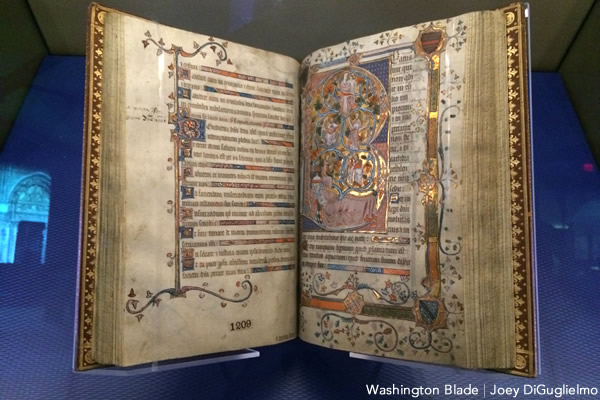
One of many historical Bibles displayed at the new Museum of the Bible in Washington. (Washington Blade photo by Joey DiGuglielmo)
Museum of the Bible
400 4th St., S.W.
Free admission
The team behind the new Museum of the Bible, which opened last weekend in Washington, said all along they wouldn’t “mention homosexuality, abortion or any other political commentary” and they’ve stayed true to their word.
The controversial museum — housed in a massive, 430,000-square-foot building three blocks from the U.S. Capitol in Southwest Washington — was established as a 501(c)(3) nonprofit in 2010. In 2012, museum personnel purchased the former Washington Design Center for $50 million and spent years having it converted into an eight-story structure with two basement levels and two new floors added to the existing rooftop at a total cost of more than $500 million.
All the effort and expense shows. This is no amateur endeavor despite the bumps in the road the billionaires behind it — it’s been largely funded by the Green family, owners of Hobby Lobby — have encountered along the way.
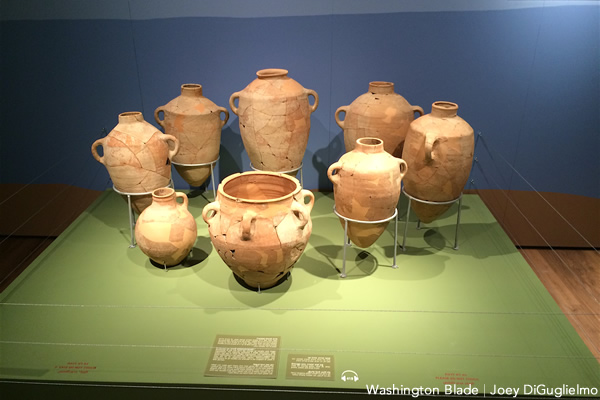
Pottery vessels on display at Museum of the Bible discovered at the Khirbet Qeiyafa, the site of an ancient fortress city overlooking the Elah Valley. Ruins of the fortress were discovered in 2007 about 20 miles from Jerusalem. (Washington Blade photo by Joey DiGuglielmo)
During a media preview last week, a few finishing touches were still being applied. Ladders and cans of paint were seen in several corridors much like they were during media previews for the National Museum of African-American History and Culture that opened last year. The museum’s communications team didn’t hesitate in including the Blade. The Blade has also learned of at least one openly LGBT person on staff at the museum.
Steve Green is president of Hobby Lobby and chair of the Museum of the Bible board. He told media at the museum on Nov. 15 that the purpose of the museum was “not about us espousing our faith.”
“The example I primarily use is in the Bible, it says, ‘In the beginning God created …,’ so we tell that story on the narrative floor but it’s not our position to tell you when God created, so we don’t take a position on whether that’s true or not. We just say, ‘Here’s the Bible story,’ and then you can decide what you do with it.”
Another recurring theme from staff is that the museum is “non-sectarian” and they’ve gone to great lengths to take an ecumenical approach. One exhibit features items on loan from the Vatican and the museum boasts what it claims is the world’s largest private collection of retired Torah scrolls and the second-largest private collection of Dead Sea Scroll fragments, the earliest-surviving manuscripts of the Hebrew Bible.
“Obviously we’re trying to be inclusive,” Green said. “We have the Israel Antiquity Authority, we have the Vatican having space in here, so it’s not about a faith tradition. We have a love for the Bible and we want to include everyone. We want atheists to feel comfortable coming in here because they’ll know, in essence, we’re not pushing our agenda. We’re just trying to educate them on a book. If you wanna believe this book is a novel, fine. Just be educated on what you believe and that’s what we wanna do.”
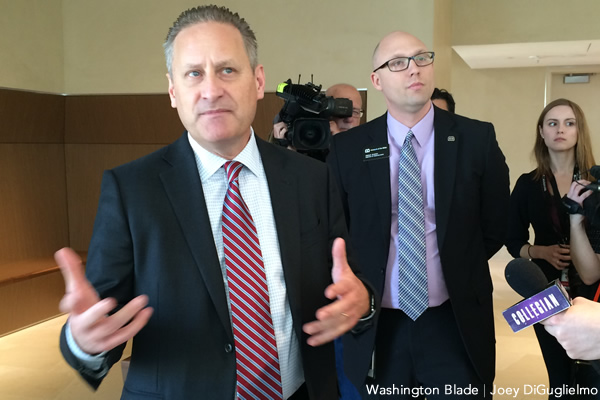
Steve Green, chairman of the Museum of the Bible board and president of Hobby Lobby, speaks to reporters at the museum on Nov. 15. (Washington Blade photo by Joey DiGuglielmo)
The scope alone is impressive. Museum personnel claim to read every placard, see every artifact and experience every activity in the museum, it would take nine days at eight hours per day.
And while some have expressed relief that the museum has taken a vastly more academic approach than, say, the Creation Museum in Petersburg, Ky., which presents the Genesis account of creation as literally true, the Museum of the Bible is still wildly controversial.
The museum has come under intense criticism — the Washington Post’s coverage has been especially tough — for several issues. Among them are:
• what some consider the Green family’s baggage from their 2014 fight against mandatory employer-provided birth control that resulted in a Supreme Court ruling that struck down the contraceptive mandate part of the Affordable Care Act requiring employers to cover certain contraceptives for female employees. The Greens have paid for newspaper ads espousing the “real meaning” of Christmas and have donated $70 million to Oral Roberts University and other evangelical institutions that lean toward the fundamentalist end of the religious spectrum according to Vox and other outlets.
• a $3 million fine imposed by the Department of Justice in a civil action suit that said the Greens, who started collecting in 2009, had obtained thousands of Iraqi artifacts they obtained without the necessary clearances in 2010 and 2011. The Greens said the seized artifacts were never part of the museum collection and said they’ve “engaged the leading experts in abiding the highest standards of museum guidelines (from the Association of Art Museum Directors) and other organizations. Those are the policies that we will adhere to here at the museum,” Green said last week.
• accusations that Hobby Lobby owners neglected to do their due diligence in acquiring the artifacts that got them in trouble. At the time, they said, “the company was new to the world of acquiring these items and did not fully appreciate the complexities of the acquisitions process. This resulted in some regrettable mistakes. The company imprudently relied on dealers and shippers who, in hindsight, did not understand the correct way to document and ship these items.” According to museum tax records cited by the Washington Post, Hobby Lobby donated about $201 million in artifacts to the museum, about 2,800 of the Greens’ 40,000-piece collection.
• a sense that the museum’s mission has shifted from inception to fruition. Perhaps, some would argue, for the better, yet it casts doubts on the owners’ intentions. According to Vox, in 2011, the museum’s nonprofit tax filings stated its purpose was “to bring to life the living Word of God, to tell its compelling story of preservation and to inspire confidence in the absolute authority and reliability of the Bible.” By 2013, the wording said simply that “we exist to invite all people to engage with the Bible.” “It felt in the last few years like they were moving from running in the primary to running in the general election,” says Matthew Vines, a prominent gay evangelical writer. “Now you’re going to focus on reaching the center and not just activating the base anymore. Now it feels more like a normal, general-election campaign.”
• the role of the National Christian Foundation, a Georgia-based organization with a mission to “advance God’s kingdom,” that has given millions of dollars annually to churches and civic groups, many of which, according to the Washington Post, are “engaged in court fights against same-sex marriage, abortion rights and other social policies.” The foundation directed about $163 million to the museum between 2013-2015 according to the Post, which cited tax returns for its information. While the museum touts that 50,000 donors have given money to the museum, which does not charge admission and is registered as a public charity, 89 percent of 2016 donations came from the National Christian Foundation; it was 96 percent in 2015, Museum President Cary Summers confirmed to the Post.
• several claims of dubious action made by Candida R. Moss, a theology professor at the University of Birmingham, and Joel S. Baden, a professor of Hebrew Bible at Yale Divinity School, in their new book “Bible Nation: the United States of Hobby Lobby” in which, according to the Post, they claim the Greens have “exploited tax-exempt rules to financially benefit from their acquisitions” and “have probably purchased forgeries, items of questionable provenance and possibly even looted antiquities.” The book also claims the Green Scholars Initiative has hired a disproportionate number of scholars with similar evangelical backgrounds and that while they maintain the Greens are well-intentioned, they accuse them of dumbing down on biblical scholarship. That they “believe it is possible to tell the story of the Bible without interpretation betrays not only their Protestant roots and bias,” the authors write, “but also their fundamentally anti-intellectual orientation.”
It’s a concern echoed by some LGBT believers as well. Because the museum just opened and few have had a chance to experience it directly, some were hesitant to say much although concerns were expressed.
Fred Davie, vice president of Union Theological Seminary, said the Bible is not a simple book.
“The way these ancient texts have been put together and then blessed by various religious bodies is very, very complicated,” Davie, who’s gay, said. “We have to be careful because most believers’ understanding of scripture in my experience is pretty much at a very basic, almost Sunday school level. … The Bible as we know it has been used to do lots of bad things to God’s creation, both creatures and flora and fauna throughout history — everything from enslaving people to denigrating women and relegating them to a lesser roles to all forms of oppression against LGBT folks.”
Davie said he’s been encouraged by media accounts he’s read that state the museum staff has attempted to be non-partisan and ecumenical, but also said the whole concept of a museum such as this could be problematic.
“You want to try to give them credit for making scripture accessible to large numbers of people and to make it popular … but it is very complex and to attempt to present the museum as an amusement is fraught with pitfalls. If they have tried to be balanced, you know, God bless them, but what I worry about is that it will simply reinforce a Sunday school, simplistic notion of scripture.”
Davie says faulty and overly simplistic interpretations of scripture historically have been used to marginalize many such as African Americans, women and gays. To approach the museum as a vehicle for entertainment, he says, could backfire with similar consequences.
Despite the curators’ claims that they aren’t getting into controversial issues such as homosexuality and abortion, the museum doesn’t tiptoe around all controversy. The second floor is devoted to the “impact of the Bible” and the “Bible in America” and goes from the book’s role in the formation of the United States culminating with “Civil Rights and beyond: equality and religious freedom.”
So why did curators delve into the issue of the Civil Rights Movement but avoid LGBT rights? The museum has exhibits devoted to topics one might not expect such as the Bible in fashion, the Bible in pop culture and others.
Seth Pollinger, director of museum content, said deciding what to include and what to leave out is an ongoing challenge for any museum, especially a new one. His role is to work as a liaison between the designers and scholars and curators. He said the team worked hard to assemble content that is “authentic and sincere and on track with reliability and constructive to the overall message of how everything fits together.”
As for possible LGBT issues in the future, Pollinger said, “I think we’re working on it.”
“I think these are the kinds of discussions that we hope to have and areas we hope to grow in in the future,” he said.
Was there a sense that some topics such as LGBT rights and the Bible might be easier to avoid because they’re so divisive? Pollinger said yes and cites how the Bible historically was used both to justify and condemn slavery, though no pro-slavery items or exhibits are in the museum.
“That was one example where we had to weigh whether or not we could do that from a social standpoint and present those things without doing something that would be offensive,” he said.
He also said that even with eight floors and 430,000 square feet, space is always an issue.
“You want to make sure you’re able to cover a wide spectrum of views and in some cases we felt like we had a very small amount of real estate available,” Pollinger said. “In the future, as we start to feature a balance of views within a small space, we can have more dialogue on that. We just felt that for opening day, we just didn’t have that all solved yet.”
Matthew Solari of BRC Imagination Arts worked on two animated films shown at the museum, one on the Old Testament, another on the New. He’s worked on similar projects for other major museums such as the Kennedy Space Center, the Epcot pavilions and more.
“When we were deciding whether this was something we wanted to throw our energies and talents into, we had several escape hatches at various points along the way where we could have gone the other direction and left,” Solari said. “But we never did. We never felt pressured in any way to say or do something we felt was betraying the promises that were made to us as storytellers in the beginning and also what we thought were going to be stories that were going to be welcoming and kind to people as opposed to people that were going to be finger wagging and thou shalt not. We weren’t interested in doing any of that kind of stuff and we were given a very wide berth. They were an excellent client to work with.”
Vines, founder of the Reformation Project, an agency that works to advance LGBT inclusion in the church, who came to prominence with the 2014 publication of his book “God and the Gay Christian: the Biblical Case in Support of Same-Sex Relationships,” said he’s “cautiously optimistic” about the Museum of the Bible.
He points to recent events in the evangelical world in which World Vision, a “sponsor-a-child” program, backtracked quickly when about 10,000 evangelicals threatened to pull their child sponsorships if the organization opened its doors to hiring gay staff, and InterVarsity Christian Fellowship, a college campus ministry, which took a renewed and harder stance against LGBT-affirming staff last fall.
“Culturally these groups are very similarly situated in terms of their support bases and … I find it encouraging that the Museum of the Bible did not feel compelled to do something similar. I could easily see a number of donors wanting to put strings on their donations and say there had to be one part of the museum that said marriage was one man, one woman for life,” Vines said. “I don’t know the politics and dynamics of those conversations but clearly that didn’t end up happening and I just appreciate, not even knowing all the back story, that the museum is not taking an oppositional position. That is a kind of progress.”
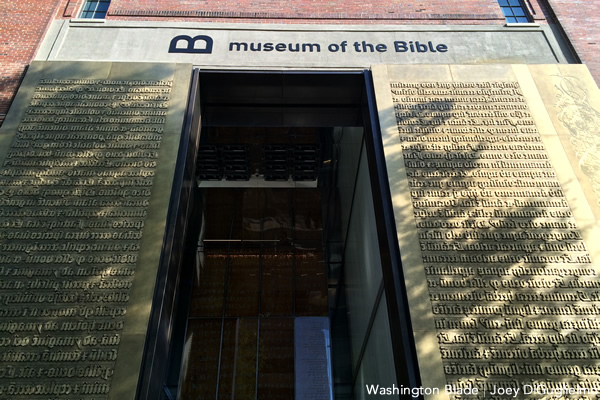
The entrance to Museum of the Bible on 4th Street in Southwest Washington. (Washington Blade photo by Joey DiGuglielmo)
a&e features
From Prohibition to Pride: Queering the District podcast reveals local LGBTQ history
The new podcast explores the hidden history and enduring impact of queer spaces in Washington, D.C.
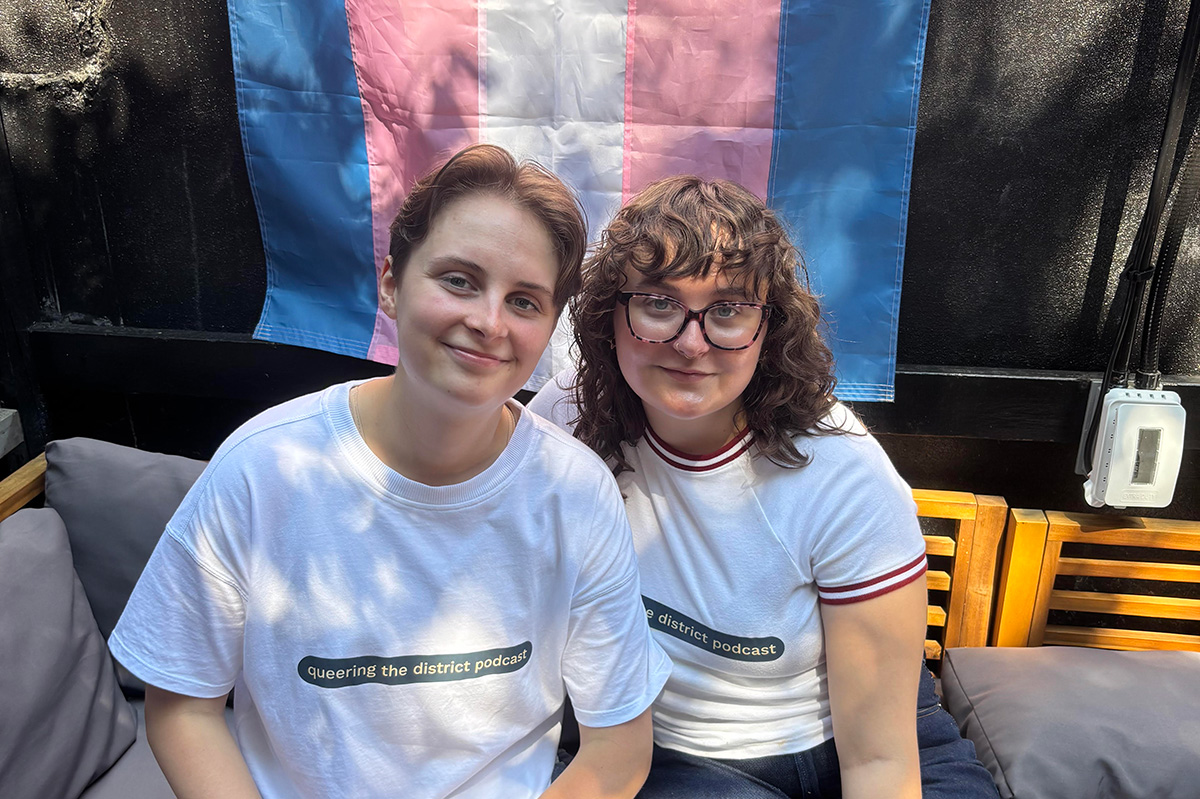
On June 25, as Pride month inched toward its end, three queer creators launched an ambitious project to honor the spaces that built D.C.’s LGBTQ community—and connect them to today’s queer life. The first episode of their podcast, Queering the District, hit streaming platforms that day, aiming to spotlight what host and co-creator Abby Stuckrath calls “third places”: bars, clubs, and gathering spots that have served as hubs for queer life across the city.
Each episode of the 10-part series delves into a different piece of D.C.’s queer past—from landmark clubs to untold personal stories—told through the voices of drag legends, activists, DJs, historians, and patrons who lived it. The show also threads together personal experiences from today’s community, bringing the listener on an auditory journey from Prohibition-era speakeasies to contemporary nights out at places like As You Are or Saints & Sinners.
Abby Stuckrath, alongside her sibling Ellie Stuckrath, and producer Mads Reagan, make up the podcast’s creative team. A recent journalism graduate of American University, Abby told the Blade that her passion for queer storytelling began during college—and that D.C. itself played a defining role in shaping her queer identity.
“I went to American University. I graduated last year and studied journalism. When I was in school, I always wanted to focus on queer stories – especially in D.C., because I’m from Denver, Colorado, I’ve never lived in a place like this before. D.C. has always just kind of been a place I call home when it comes to my queer identity.”
But breaking into the media to tell those stories wasn’t easy. Stuckrath quickly learned that editorial support—and funding—for queer-focused projects is limited. So she decided to do it her own way.
“I kind of found out that if you want to tell stories, you kind of have to do it on your own– especially when it comes to queer stories. There’s not a lot of people begging for us to talk about queer people and to pay you for it. So I was like, ‘Okay, let’s just do it on my own.’”
The idea for the podcast first took root in conversations with Ellie, Abby’s sibling and biggest supporter. Ellie had also moved to D.C. to find more space to explore and express their queer and gender identities. Together, the two began shaping a vision that would combine storytelling, sound design, and grassroots community input.
“I was like, ‘I don’t know what exactly I want to do yet, but I want it to be queer, and I want it to be about D.C., and it’s going to be called Queering the District, and we’re going to find out what that means.’ And Ellie is my biggest supporter, and my best friend. And they were like, ‘Hell yeah. Like, let’s do this.’ And so we decided to just do it together.”
The name stuck—and so did the mission. The team began researching queer D.C. history and found a city overflowing with stories that had rarely been documented, especially in mainstream archives.
“We started looking up the history of queer culture in D.C., and it kind of just clicked from there,” Stuckrath said. “I did not know anything about how rich our history is in the city until one Google search, and then I just kept learning more and more. I was kind of pissed because I studied gender studies in school in D.C. and didn’t learn shit about this.”
Season one focuses on the role of third places—non-work, non-home spaces where queer people could gather, exist fully, and build community.
“Third places have always been the epicenter of queer life… places outside of just your own personal home, because sometimes that isn’t a safe place. And of course, the work most commonly in the past and still today, isn’t a safe place for queer people to be full of themselves. So like, bars were the first place for queer people to really thrive and meet each other.”
To make the show participatory, Queering the District includes a twist: a voicemail line where anyone can call in and share a memory or question. The team calls the phone “Fifi”—a nod to the kind of retro guestbooks often used at weddings, but reimagined for queer nightlife and history.
“We wanted to find a way for people to share their stories with us anonymously… so even though we start in Prohibition, we wanted to connect it to now—like, those people who were singing jazz to each other in a white queer bar are connected to you singing karaoke on a Sunday night at your favorite gay bar. We’re all interconnected by this third place of queer bars in D.C.”
Those connections are emotional as well as historical. While building the series, one realization hit Stuckrath particularly hard: the immense loss of queer spaces in D.C., especially in neighborhoods that have since been heavily redeveloped.
“Every time I go to a Nats game, I think about, well, this just replaced five gay bars that used to be here. It used to be the home of Ziegfeld’s… Tracks, which was almost 2,000 square feet, with a volleyball court in the back, a fire pit, and iconic light show. I just didn’t know that we had that, and it made me sad for the queer elders that are in our city now who walk the streets and don’t see all those places they used to call home.”
That sense of loss—alongside the joy and resilience of queer community—is what the show aims to capture. As the podcast continues, Abby hopes it serves as both a celebration and an educational tool, especially for young LGBTQ people arriving in D.C. without realizing the queer foundations they’re walking on.
“D.C. is a unique city, and specifically young queer people who are hoping to move to the city—to know that you’ve got to know your history to be here. I hope this serves as an easier way for you to consume and learn about queer history, because queer history defines how we move in life.”
And for all the voices still left out, Abby is clear: this podcast is an open door, not a final word.
“This is a perfectly imperfect podcast. We should just be a starting point. We shouldn’t be the ending point.”
New episodes of Queering the District drop every Wednesday on all major platforms.
a&e features
Doug Spearman takes his chance
‘Noah’s Arc: The Movie’ debuted on Paramount+ last month

There’s no question that when Patrik-Ian Polk’s series “Noah’s Arc” premiered on Logo 20 years ago, it was a groundbreaking creation. The story of a group of Black gay men and their wonderful friendship. The titular arc was that of the cute main character, Noah (Darryl Stephens), and his close-knit circle of friends, including Chance played by gay actor Doug Spearman. This compelling and loving fraternity may, in fact, be what brought viewers back repeatedly, including a 2008 movie, “Noah’s Arc: Jumping the Broom,” as well as the 2020 “Noah’s Arc” short, and now, a new full-length feature “Noah’s Arc: The Movie,” debuting on Paramount+ on June 20. In the movie, filled with equal measures of laughs and tears, Chance, who has faced a devastating loss, finds his dependable friends there, ready to support and comfort him at a moment’s notice. I had the pleasure of speaking with Spearman the morning of the streaming premiere of “Noah’s Arc: The Movie.”
WASHINGTON BLADE: Doug, since the early 2000s, when the “Noah’s Arc” series premiered on Logo, you have been playing the character of Chance, including in the latest installment, “Noah’s Arc: The Movie.” What was it about Chance that appealed to you as an actor?
SPEARMAN: When Patrik (-Ian Polk) called me to ask me to play him (Chance), I was at JFK airport in the baggage claim, waiting for a suitcase. He explained what the part was. The thing that stuck out to me was the fact that Chance was in a long-term relationship with another Black man. And, they had a child; they had a 4-year-old daughter named Kenya. I had never seen two Black gay men raise a child on TV before. I thought it was the most revolutionary thing I’d ever seen. I immediately thought I’ve got to do this because that was something nobody had seen. I thought it was incredibly important to take the part.
BLADE: “Noah’s Arc: The Movie” was, once again, written and directed by Patrik-Ian Polk, who you just mentioned, is the creator of the entire franchise. What’s the secret to your long-standing working relationship?
SPEARMAN: [Laughs] the whole team, all of us, are like a band of brothers. We fight like brothers, we come together like brothers, we hash things out, we talk, because we’re all very different from our characters. I think the challenge of playing these guys and then uplifting these men, playing a part, especially something written by Patrik, is like solving a math equation. There’s always a challenge that’s enjoyable for me as an actor: to try to find out what it is that Patrik wants, and then how do I do it.
BLADE: I think you do a very good job of it.
SPEARMAN: Thank you very much
BLADE: In the years between “Jumping the Broom” and the new full-length movie, many changes have occurred, and the story addresses some of them, including gay widowhood, which is something that the aging community is now confronting, as well as mental health issues. Please say a few words about how you approached those subjects in the new movie.
SPEARMAN: I had a lot of loss in my life, right before we started shooting. Two months before we started shooting the first series, my mother died. I was going through the grief process through that whole first season. Since then, I’ve lost a lot of people in my life. In fact, when we started shooting the second season, the second week we were shooting, my ex died of a heart attack. I was having to fold that into what I was doing with my life on the set and off the set. You’ve got to show up and you’ve got to do your work. The first two seasons of “Noah’s Arc” are always tinged with the memory of grief. So, when I had to deal with the death that Chance faces (in the new movie), which is a significant death in his life, it wasn’t that hard to reach back, especially the scene in the graveyard. It was something that I unfortunately could pull from personal experience.
BLADE: Shifting gears, the movie features delightful cast surprises, including Jasmine Guy and TS Madison. Did you have a chance to interact with either or both when they were on set?
SPEARMAN: No, I didn’t have any scenes with Jasmine, and I missed her. I wish I had gotten to see her because I actually got to direct Jasmine for a CBS promo shoot for “Queen,” back in the early ‘90s. I had a huge crush on her when she was on “A Different World.” So, I really would have liked to reconnect. But TS and I got to see each other every day because I was in all her scenes. It was extraordinary being around somebody like that. That is one outspoken woman!
BLADE: Even though Beyoncé never makes an appearance in the movie, there’s a lot of talk about her. Would you say you are a Beyoncé fan?
SPEARMAN: Yes! I’m breathing! Yes, I’m a Beyoncé fan. I actually got the chance to meet her. I knew her mom. Her mom was extraordinary to me. She is in the second movie I directed. She also gave us a wedding gown to use in the very first scene of the movie. That family is extraordinarily important to me. Not only just to be a fan, but to be somebody who’s gotten to know them and work with them and see how hard they work. I don’t think anybody works as hard as Tina or Beyoncé.
BLADE: There was a recent news item about gay actor Benito Skinner of the Amazon Prime series “Overcompensating” being told not to bother auditioning for straight roles. As an out actor yourself, how important do you think it is for queer characters to be portrayed by queer actors, and vice versa?
SPEARMAN: Being queer is a multifaceted identity. There’s no one kind of queer person. I think finding the best actor that’s your first circle of casting. I think one of the joys about being an actor is that you get to play different parts. I play straight guys all the time. Dads and husbands and things like that. I think a lot of people are told not to do it. In fact, I wouldn’t be Chance if the actor who was originally cast as Chance hadn’t been pulled out of the series by his agents because they didn’t want him to play a gay character.
BLADE: That’s amazing! Thank you for sharing that. Without giving away too much, the ending of the movie is a little ambiguous, even ending with a question mark. If there was a “Noah’s Arc: The Movie” sequel, would you come back for that?
SPEARMAN: Yeah! A lot of it would depend on what Chance’s journey is going to be like. Patrik and I have conversations like that all the time. He’s very interested and supportive of input. I hope I would be, as we all would be, part of the creative growth with these characters. They live in Patrik’s head, and he writes them, but we’re the ones who have to flesh them out. It’s a conversation, it’s always a conversation.
BLADE: You are currently performing in Molière’s “The Imaginary Invalid” as part of the New Orleans Shakespeare Festival at Tulane. What has this experience been like for you?
SPEARMAN: It’s extraordinary! I started on stage when I was seven. There’s nothing like working with a live audience and having that immediacy. I’m working with an extraordinarily talented cast in a really great play, and I have some of the best scene partners I could ever want.
BLADE: Are there any upcoming film or TV projects you’d like to mention?
SPEARMAN: I’m still a writer, and I’m still a director, and I’ve still got scripts that I would like to make. I have a little something that’s a cross between “Treme” and “Bridgerton” that I want to do. I’m always trying to figure out what the next thing is.
a&e features
Visit Cambridge, a ‘beautiful secret’ on Maryland’s Eastern Shore
New organization promotes town’s welcoming vibe, LGBTQ inclusion

CAMBRIDGE, Md. — Driving through this scenic, historic town on Maryland’s Eastern Shore, you’ll be charmed by streets lined with unique shops, restaurants, and beautifully restored Victorian homes. You’ll also be struck by the number of LGBTQ Pride flags flying throughout the town.
The flags are a reassuring signal that everyone is welcome here, despite the town’s location in ruby red Dorchester County, which voted for Donald Trump over Kamala Harris by a lopsided margin. But don’t let that deter you from visiting. A new organization, Proudly Cambridge, is holding its debut Pride event this weekend, touting the town’s welcoming, inclusive culture.
“We stumbled on a beautiful secret and we wanted to help get the word out,” said James Lumalcuri of the effort to create Proudly Cambridge.
The organization celebrates diversity, enhances public spaces, and seeks to uplift all that Cambridge has to share, according to its mission statement, under the tagline “You Belong Here.”
The group has so far held informal movie nights and a picnic and garden party; the launch party is June 28 at the Cambridge Yacht Club, which will feature a Pride celebration and tea dance. The event’s 75 tickets sold out quickly and proceeds benefit DoCo Pride.
“Tickets went faster than we imagined and we’re bummed we can’t welcome everyone who wanted to come,” Lumalcuri said, adding that organizers plan to make “Cheers on the Choptank” an annual event with added capacity next year.
One of the group’s first projects was to distribute free Pride flags to anyone who requested one and the result is a visually striking display of a large number of flags flying all over town. Up next: Proudly Cambridge plans to roll out a program offering affirming businesses rainbow crab stickers to show their inclusiveness and LGBTQ support. The group also wants to engage with potential visitors and homebuyers.
“We want to spread the word outside of Cambridge — in D.C. and Baltimore — who don’t know about Cambridge,” Lumalcuri said. “We want them to come and know we are a safe haven. You can exist here and feel comfortable and supported by neighbors in a way that we didn’t anticipate when we moved here.”

Lumalcuri, 53, a federal government employee, and his husband, Lou Cardenas, 62, a Realtor, purchased a Victorian house in Cambridge in 2021 and embarked on an extensive renovation. The couple also owns a home in Adams Morgan in D.C.
“We saw the opportunity here and wanted to share it with others,” Cardenas said. “There’s lots of housing inventory in the $300-400,000 range … we’re not here to gentrify people out of town because a lot of these homes are just empty and need to be fixed up and we’re happy to be a part of that.”
Lumalcuri was talking with friends one Sunday last year at the gazebo (affectionately known as the “gayzebo” by locals) at the Yacht Club and the idea for Proudly Cambridge was born. The founding board members are Lumalcuri, Corey van Vlymen, Brian Orjuela, Lauren Mross, and Caleb Holland. The group is currently working toward forming a 501(c)3.
“We need visibility and support for those who need it,” Mross said. “We started making lists of what we wanted to do and the five of us ran with it. We started meeting weekly and solidified what we wanted to do.”
Mross, 50, a brand strategist and web designer, moved to Cambridge from Atlanta with her wife three years ago. They knew they wanted to be near the water and farther north and began researching their options when they discovered Cambridge.
“I had not heard of Cambridge but the location seemed perfect,” she said. “I pointed on a map and said this is where we’re going to move.”
The couple packed up, bought a camper trailer and parked it in different campsites but kept coming back to Cambridge.
“I didn’t know how right it was until we moved here,” she said. “It’s the most welcoming place … there’s an energy vortex here – how did so many cool, progressive people end up in one place?”
Corey van Vlymen and his husband live in D.C. and were looking for a second home. They considered Lost River, W.Va., but decided they preferred to be on the water.
“We looked at a map on both sides of the bay and came to Cambridge on a Saturday and bought a house that day,” said van Vlymen, 39, a senior scientist at Booz Allen Hamilton. They’ve owned in Cambridge for two years.
They were drawn to Cambridge due to its location on the water, the affordable housing inventory, and its proximity to D.C.; it’s about an hour and 20 minutes away.
Now, through the work of Proudly Cambridge, they hope to highlight the town’s many attributes to residents and visitors alike.
“Something we all agree on is there’s a perception problem for Cambridge and a lack of awareness,” van Vlymen said. “If you tell someone you’re going to Cambridge, chances are they think, ‘England or Massachusetts?’”
He cited the affordability and the opportunity to save older, historic homes as a big draw for buyers.
“It’s all about celebrating all the things that make Cambridge great,” Mross added. “Our monthly social events are joyful and celebratory.” A recent game night drew about 70 people.
She noted that the goal is not to gentrify the town and push longtime residents out, but to uplift all the people who are already there while welcoming new visitors and future residents.
They also noted that Proudly Cambridge does not seek to supplant existing Pride-focused organizations. Dorchester County Pride organizes countywide Pride events and Delmarva Pride was held in nearby Easton two weeks ago.
“We celebrate all diversity but are gay powered and gay led,” Mross noted.
To learn more about Proudly Cambridge, visit the group on Facebook and Instagram.
What to see and do
Cambridge, located 13 miles up the Choptank River from the Chesapeake Bay, has a population of roughly 15,000. It was settled in 1684 and named for the English university town in 1686. It is home to the Harriet Tubman Museum, mural, and monument. Its proximity to the Blackwater National Wildlife Refuge makes it a popular stop for birders, drawn to more than 27,000 acres of marshland dubbed “the Everglades of the north.”
The refuge is walkable, bikeable, and driveable, making it an accessible attraction for all. There are kayaking and biking tours through Blackwater Adventures (blackwateradventuresmd.com).
Back in town, take a stroll along the water and through historic downtown and admire the architecture. Take in the striking Harriet Tubman mural (424 Race St.). Shop in the many local boutiques, and don’t miss the gay-owned Shorelife Home and Gifts (421 Race St.), filled with stylish coastal décor items.
Stop for breakfast or lunch at Black Water Bakery (429 Race St.), which offers a full compliment of coffee drinks along with a build-your-own mimosa bar and a full menu of creative cocktails.
The Cambridge Yacht Club (1 Mill St.) is always bustling but you need to be a member to get in. Snapper’s on the water is temporarily closed for renovations. RaR Brewing (rarbrewing.com) is popular for craft beers served in an 80-year-old former pool hall and bowling alley. The menu offers burgers, wings, and other bar fare.
For dinner or wine, don’t miss the fantastic Vintage 414 (414 Race St.), which offers lunch, dinner, wine tasting events, specialty foods, and a large selection of wines. The homemade cheddar crackers, inventive flatbreads, and creative desserts (citrus olive oil cake, carrot cake trifle) were a hit on a recent visit.
Also nearby is Ava’s (305 High St.), a regional chain offering outstanding Italian dishes, pizzas, and more.
For something off the beaten path, visit Emily’s Produce (22143 Church Creek Rd.) for its nursery, produce, and prepared meals.
“Ten minutes into the sticks there’s a place called Emily’s Produce, where you can pay $5 and walk through a field and pick sunflowers, blueberries, you can feed the goats … and they have great food,” van Vlymen said.
As for accommodations, there’s the Hyatt Regency Chesapeake Bay (100 Heron Blvd. at Route 50), a resort complex with golf course, spa, and marina. Otherwise, check out Airbnb and VRBO for short-term rentals closer to downtown.
Its proximity to D.C. and Baltimore makes Cambridge an ideal weekend getaway. The large LGBTQ population is welcoming and they are happy to talk up their town and show you around.
“There’s a closeness among the neighbors that I wasn’t feeling in D.C.,” Lumalcuri said. “We look after each other.”
-

 Virginia2 days ago
Virginia2 days agoDefying trends, new LGBTQ center opens in rural Winchester, Va.
-

 South Africa5 days ago
South Africa5 days agoLesbian feminist becomes South African MP
-

 Travel4 days ago
Travel4 days agoManchester is vibrant tapestry of culture, history, and Pride
-

 Opinions3 days ago
Opinions3 days agoUSAID’s demise: America’s global betrayal of trust with LGBTQ people












